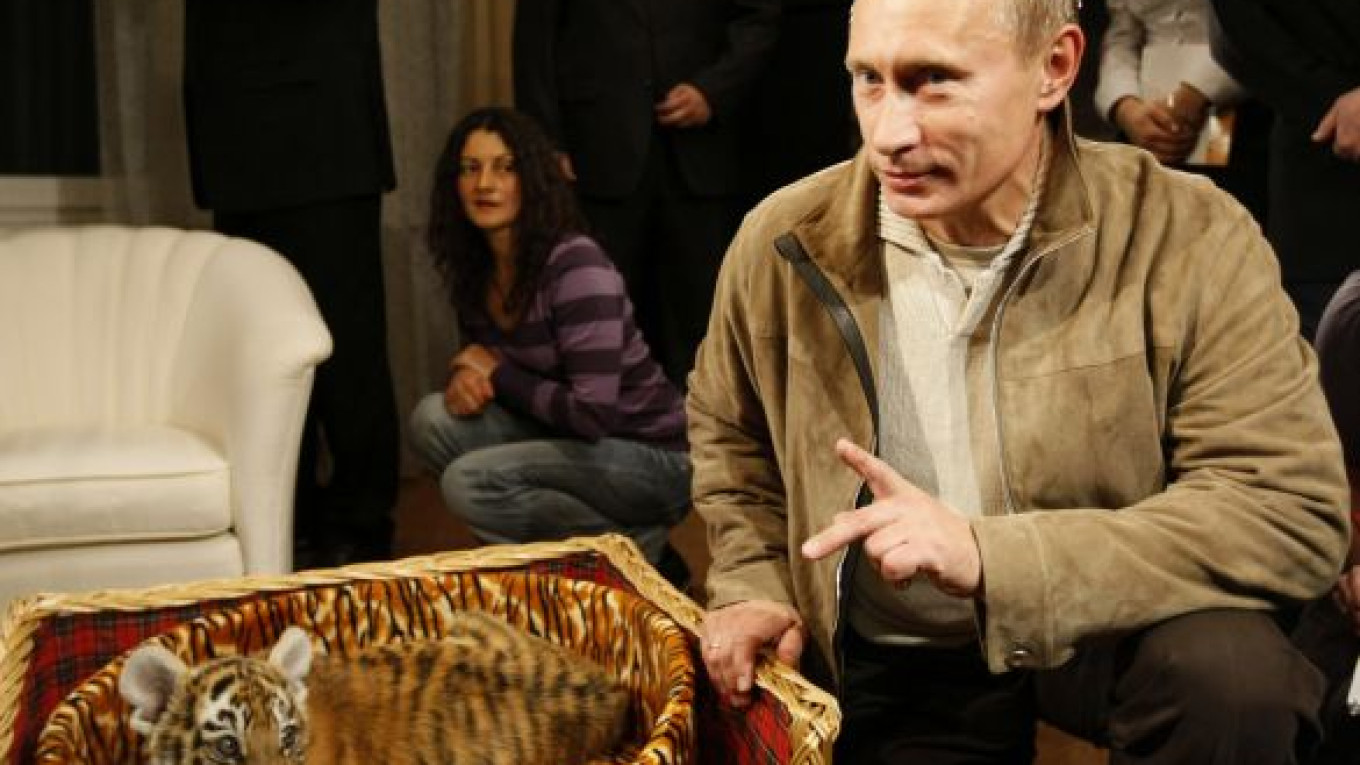Prime Minister Vladimir Putin has come out with flattering praise for scientists studying wildlife in what looked like a review of his 10-day tour of the country's remotest regions in August.
But environmentalists cried foul, saying Putin had done more harm than good for the country's wildlife since coming to power a decade ago.
In a column for the Russky Pioner glossy magazine due to be published Sept. 27, Putin revealed that he likes "events in which fauna take part," according to excerpts carried by RIA-Novosti on Wednesday.
Putin, who met biologists at the Arctic Circle and shot at a gray whale in the Pacific during an action-packed trip in late August, said scientists studying nature out in the field did not get the attention they deserve.
"You and I hang around in capital cesspools, believing that we are the most important people on Earth," Putin said. "But actually there is something more important. To understand this is actually not difficult. You just need to meet them."
Putin said those who study nature and wildlife deal with eternal issues, while "we deal with vanity."
The prime minister, who has developed the image of an ascetic even though he presided over an unprecedented economic boom during his eight-year reign as president, said he had great respect for scientists' humility.
? "I love to see people, just honest people, who don't do small-time routines but serious big things — and without begging for anything for themselves," he said.
He said he wanted to meet with the researchers again from time to time to just chat.
Putin, who was labeled a "predator of the press" by journalism watchdog Reporters Without Borders earlier this year, has frequently posed with animals in the past.
His Premier.gov.ru web site even features special subsections devoted to polar bears, the Siberian tiger and the beluga whale, showing Putin posing with the animals.
In October 2008, Putin even received a tiger cub as a birthday present at his Novo-Ogaryovo residence. Putin told reporters that the tiger was "the most original present of my life" but refused to say who gave it to him.
He also has often taken his dog, a black Labrador Retriever named Connie, to meetings with world leaders.
? Other members of Putin's personal animal kingdom include a poodle named Tosya, a horse called Vadik and a goat that goes by the name of Skazka (Fairy Tale).
Critics said Putin's article is just part of a carefully crafted publicity stunt, while the prime minister has done much to harm the environment since becoming president in 2000.
"Putin might really like animals, but that alone is not enough," said Ivan Blokov, a senior official with Greenpeace Russia.
Blokov said Putin signed a host of laws that hurt the country's ecology during his presidency. As examples, he pointed to a 2001 law that allows the import of spent nuclear fuel, and the 2006 Building Code that scrapped environmental impact assessments. He also named January's decision to reopen the Baikalsk Pulp and Paper Mill on the shores of Lake Baikal.
Vladimir Slivyak, co-chair of Ecodefense, a Moscow-based environmental group, said Putin's energy policies were causing ecological destruction by focusing on coal and nuclear fuel to generate power. He also noted that Putin abolished the State Environmental Committee early in his presidency and handed its duties to the Natural Resources Ministry, effectively leaving the country without any environmental management.
"He practically always chooses what does the biggest harm to the environment, Slivyak said.
Putin's spokesman Dmitry Peskov denied the accusations. "The protection of the environment plays a vital role in Putin's policies and continues to do so," he told The Moscow Times.
Peskov especially defended the reopening of the Baikal plant, arguing that it was a compromise between ecology and labor policies. "The lives of many people depend on that factory," he said.
Peskov also said Putin did not write the column himself but dictated it to Kommersant reporter Andrei Kolesnikov during an interview in a Lada Kalina that Putin drove through eastern Siberia last month.
Kolesnikov also acts as editor of Russky Pioner.
A Message from The Moscow Times:
Dear readers,
We are facing unprecedented challenges. Russia's Prosecutor General's Office has designated The Moscow Times as an "undesirable" organization, criminalizing our work and putting our staff at risk of prosecution. This follows our earlier unjust labeling as a "foreign agent."
These actions are direct attempts to silence independent journalism in Russia. The authorities claim our work "discredits the decisions of the Russian leadership." We see things differently: we strive to provide accurate, unbiased reporting on Russia.
We, the journalists of The Moscow Times, refuse to be silenced. But to continue our work, we need your help.
Your support, no matter how small, makes a world of difference. If you can, please support us monthly starting from just $2. It's quick to set up, and every contribution makes a significant impact.
By supporting The Moscow Times, you're defending open, independent journalism in the face of repression. Thank you for standing with us.
Remind me later.


